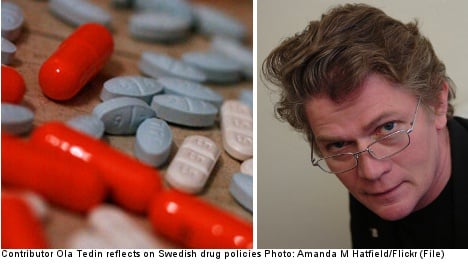The tragic death of MP and former Sweden Democrat William Petzäll, apparently from an overdose, clearly shows how Sweden’s irrational drug policy costs lives.
In many ways it resembles the Pope’s staunch resistance to contraceptives, another example where moralism is upheld at the cost of lives.
Few Swedes would see any sense in, from a moral standpoint, denying people the use of contraceptives. Using a condom not only prevents pregnancies, it also protects both parties from venereal disease and, of course, the deadly HIV-virus.
Notions that sex is for married couples in the sole purpose of procreation have long since vanished from the public mind.
So when the Catholic Church stops free-condom programmes in the developing countries on the grounds that it encourages adultery and extramarital sex, we Swedes tend to think that the Pope has a screw loose.
After all, condoms clearly would have helped reduce the catastrophic HIV epidemic that has hit parts of Africa. Admonishing people to abstain from all sorts of sex that is not intended to produce offspring seems more than just a little naive when such a policy instead helps to aggravate the HIV epidemic.
Yet, narcotic policies in Sweden are often reminiscent of the Catholic Church’s stance on contraception.
Studies show that programmes for free needles, methadone and maybe even prescribed heroin not only save lives, it also reduces both human suffering and crime, thus greatly lowering the huge human and material costs on society that drug abuse causes.
The reason why policies in this direction are not pursued, or even discussed?
The answer usually goes along the lines that “narcotics are illegal and it would send the wrong signals to hand out drugs or needles to addicts”.
I recently heard the Christian Democrat Minister for Children and the Elderly, Maria Larsson, pontificating along those lines on the radio.
But apart from not having succeeded in any significant reduction of substance abuse, despite decades of ever tougher legislation, a very different signal is sent more or less daily and William Petzäll became part of it.
He started as a Sweden Democrat but an internal conflict turned him into a rogue parliamentarian. I have no sympathy what so ever for the simplistic political ideas for which he stood.
Nor do I approve of the use of narcotics, the damage they cause, or the human suffering that follows.
Yet, it’s clear that addiction, whether to prescribed medicine or illegal drugs from the street, is as much an illness as, say, alcoholism or eating disorders.
Still, people in William Petzäll’s position are today more likely to end up in prison than in rehab. And sometimes only for having minuscule amounts of illegal substances in their bloodstream.
As a result of this moralistic stance, Sweden has an unusual high percentage of drug-related deaths.
About 400 people die every year as a result of their addiction, an internationally high figure that probably would be a lot lower if the addicts were to be primarily treated as suffering patients and not as wanton criminals.
After all, what is better: denying treatment of a morally repugnant behaviour because it is wrong and should be punished?
Or actually treating that behaviour in a way that saves lives?
If you prefer the former, try applying it on obesity or alcoholic liver disease.
If that still makes you feel morally comfortable, forget the latter.
Ola Tedin has written opinion journalism for several Swedish dailies, including Sydsvenskan and Expressen. He was the op-ed editor of the Ystad Allehanda newspaper from 2001 to 2011.



 Please whitelist us to continue reading.
Please whitelist us to continue reading.
Member comments